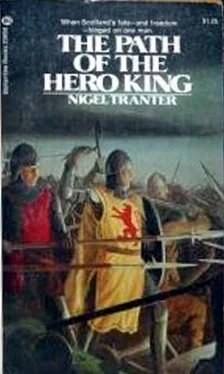Galloway shall pay the price, this time. I shall deal with Galloway as I dealt with Buchan.
No, the King said.
Not quite that, Edward, I charge you.
This war, not punishment. And glutted men fight but slackly. The English will always be at your elbow. This will not be Buchan again. But, see you-win me Galloway, and you shall be Lord of Galloway. Your province, brother.
There were moments of silence, as the significance of this sank in. It was a notable promise, of an enormous heritage, a princedom indeed-the first such kingly bestowal of the reign. It would spur on Edward, or any man. But also, of course, if Galloway was to be his own thereafter, Edward would not wish to destroy and harry it any more than he must. None there failed to see the meaning of this.
I thank you, Sire, the other said, carefully.
Aye. Sir Robert Boyd will be with you, as lieutenant. Heed his counsel. You shall have most of my knights. And hereafter, if I can spare more of my main host, I shall send it.
Does Douglas come with me? Edward undoubtedly was jealous of James Douglass position in the Kings esteem.
No. Not yet. My lord of Douglas remains with me here. He turned.
My lord of the Isles-you also, if you will, to move swiftly tonight. Ahead, to the sea. Secretly. Your galleys lie off Kerrera isle, still? In the Firth of Lorn, threatening MacDougall?
Yes-then will you make shift to reach them, and bring them to my aid? MacDougall lies in Dunstaffnage Castle, at the mouth of Etive. There I shall seek him. He will try to halt me before that, to be sure. But Dunstaffnage is my target. Will you menace it by sea?
And bring your galleys up Loch Etive, to support my advance I would sooner sail south. To strike at Galloway.
No doubt. And so you shall. Aid me at Dunstaffnage and Etive, and then sail for Galloway. Your galleys will travel more swiftly than men and horses. He took Angus Ogs agreement for granted.
How soon can you have your ships in Loch Etive?If they are still in
the anchorage of Kerrera, as I commanded, I can have them sailing up Etive in two or three hours. But I must get to Kerrera first. Through MacDougall country. Or skirting it.
Forty miles. To Gallanach. Then a boat across to Kerrera island.
Starting now, my lord? How long?
Riding through the night, I could be down Glen Orchy and crossed Loch Awe by sunrise. Through the Glen Nant and Glen Lonan hills to the Sound of Kerrera in daylight, Campbell country.
I could be at the sea by nightfall. At this hour tomorrow I could be with my galleys.
God willing, the King commented.
Good. Then the day following, can I look for you in Loch Etive?
Yes. When, depends on the tide. The mouth of that loch shoals badly.
Only at high tide could we win through.
Very well. Tomorrow this host will move down Glen Orchy, and along
Aweside. Then through the Pass of Brander the next day, to Etive
That pass will be held against you. It is the key to Lorn. A sore place to win through.
Well I know it. But I cannot ferry thousands across Loch Awe, as you will go. So Brander it needs must be. There is no other route, is there? For an army. We must win through Brander, then.
Your galleys threatening MacDougalls rear, in Etive, should aid us.
It will be hard task, Sire, Campbell put in.
Remember Clifford in Glen Trool. Brander is ten times worse. It is like to the gates of hell!
It is Glen Trool that I am remembering, Neil. We must reverse Glen Trool.
Angus Og, like others, looked doubtful. But he shrugged.
So be it, Sir King-I ride for Gallanach and Kerrera. Tomorrows morn I will have my galleys under Cruachan, at the far side of Brander.
Wherever you may be! Let us eat…
So, less than a couple of hours later, the two very different companies set out from the new camp by Loch Tulla, from the ruddy glow of fires into the wan shadows of the August late evening;
Angus, with perhaps a score of his captains, on shaggy Highland garrons, to head south by west down Orchy; and Edward and his glittering knightly throng to lead his 600 jingling men-at-arms south. eastwards by the main drove road across the mounth of Mamlorn, for the Lowlands. There was no question but that Edward at least, went in high spirits.
Watching them go, with his much reduced little band of close companions, Bruce sighed.
Much Scots blood will be shed before
MS
we all forgather again, I fear. My sorrow that it must be I who ordains it.
Do not blame yourself, Sire, Douglas said.
Who shall I blame?
The dead Edward. Edward of England, Lennox averred.
On him alone lies the blame for all. One mans hatred and lust for power. All those years ago. A great man, a great king, turned lour!
Aye-so great a man consumed! By a worm at his heart. Why, Malcolmwhy? I honoured Edward once. Esteemed, almost worshipped him. Loved him better than my own father. He was the greatest prince in Christendom, the finest knight, the best soldier, the ablest ruler. Edward Plantagenet. And yet-this! Destroyed and destroying. For what? For a notion, a false notion. Laced with spleen.
He thought to play God, Campbell put in briefly.
And we all suffer.
Aye. All men suffer when a king errs, Bruce nodded sombrely.
And the greater the king the greater the suffering. Here is a lesson for me, at least-however small a king! If ever I think to play God! Watch it, my friends-and save me from myself.
With the Scots to rule, there is little risk of that, I think!
Thomas Randolph said-and for once brought smiles.
Another camp by another loch, a loch as great as Loch Ness, this one, one of the largest and longest in Scotland. Lying northeast and southwest, Loch Awes club-foot thrust off a long toe north westwards into the narrows of the fierce defile of Brander, down which it poured its outflow, the brief but major River Awe, four miles, no more, to the arm of the sea called Etive. In the other direction the loch presented a mile-wide barrier for twenty-three miles, almost to the sea again at Craignish, a mighty moat guarding the country of Lorn. Trackless impassable mountains, in a vast semi-circle, sealed off the north.
It was early morning, and the lately risen sun was streaming rays slantwise down the valley of Glen Orchy at their backs, into the wide green upland amphitheatre which cradled the foot of the loch. Bruce was standing on a birch-crowned knoll above the shore, and staring due westwards to where the water altered all its character, exchanged all its blue-and-gold loveliness, mirrored amongst green and purple hills, for a narrowing smooth dark torrent that swept dramatically into the grim portals of a mighty gorge, there to disappear in sombre shadow. Brander.
The daunting place dominated all this north end of the loch, below the
tremendous multi-peaked mass of Cruachan. It was unlike any pass the majority even of the Highlanders had ever seen, a huge, flooded, steep-sided gullet of the mountains, vast in scale, a barren rock-lined funnel with unbroken sides soaring from 800 to 1,200 feet before easing off into the normal hill-flanks above. All the floor of that long defile was deep dark green, deceitfully smooth but swift-flowing water, with no banks or shores. And there were three miles of it.
All night Bruces scouts had been bringing in reports, and the King had scarcely closed his eyes throughout. The pass was held in great strength by the enemy. There was a single slender track along its north side, the only road, at wildly varying heights above the water, clinging like ivy to the rock-face. How consistently the length of this was held could not be ascertained, because scouts could not get past the first block. This was at a point about a mile along where, at a wooded cleft, a fairly strong party was stationed, guarding timber barricades. But high above, on the side of Cruachan itself, where the steepest walls of the defile levelled off somewhat, were large numbers of MacDougall clansmen, ranked all along the hillside. No doubt, beyond, at the far end of the pass, there would be more waiting.
Читать дальше












